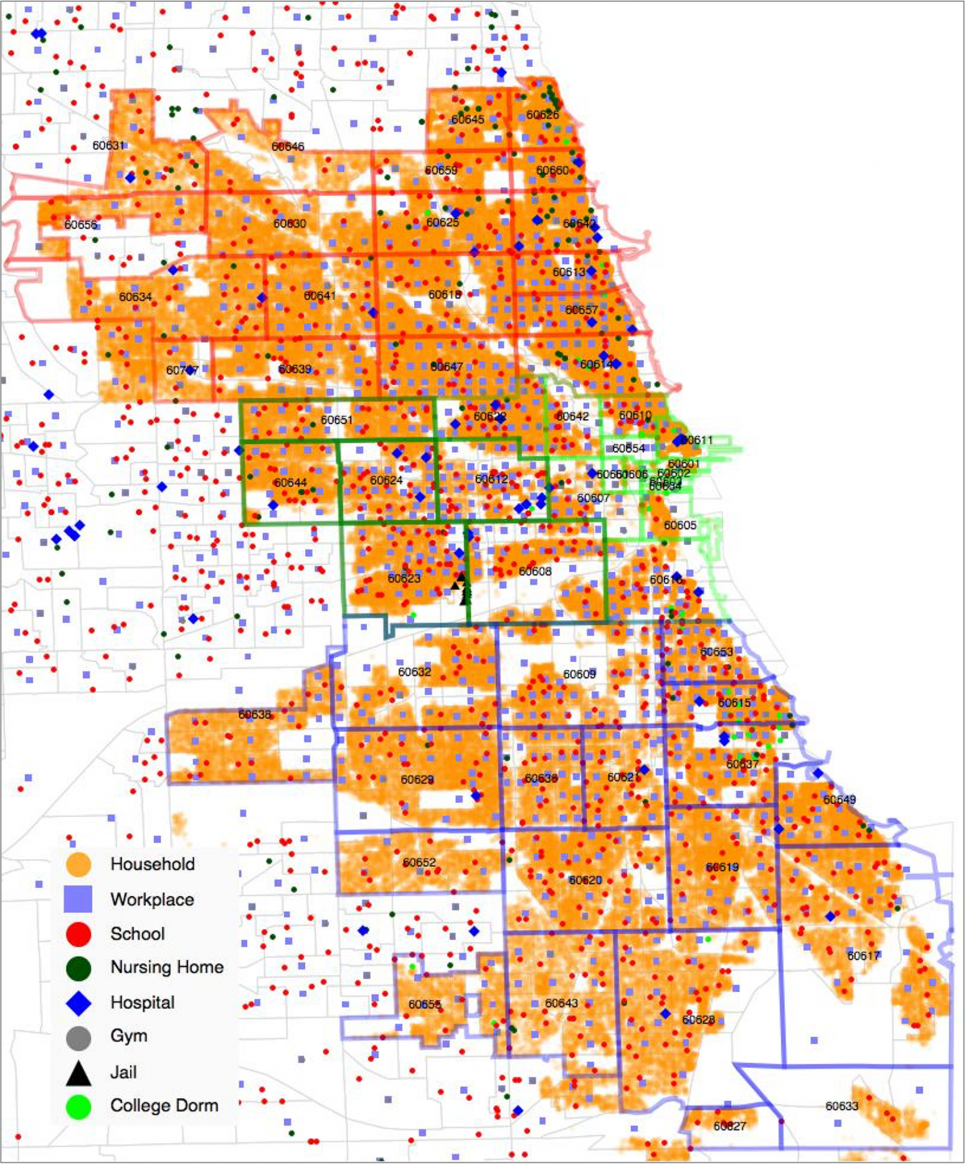
Argonne epidemiological supercomputing model showcases innovation
CityCOVID, a model demonstrating the interactions between “agents” during the pandemic, was nominated for an ACM Gordon Bell prize.
When the COVID-19 pandemic broke out in Chicago late last winter, epidemiologists were confronted with a challenge they had never seen before. While experts had previously been able to model outbreaks like the Zika virus, the scale, spread, and virulence of COVID-19 necessitated a quick and accurate response.
At the U.S. Department of Energy’s (DOE) Argonne National Laboratory, scientists have developed CityCOVID, a large-scale agent-based epidemiological model that is capable of tracking the movements of millions of individuals — the agents — as they go about their daily activities. The model is being used to better understand the implications of the spread of COVID-19 in Chicago and surrounding areas. Over the course of the pandemic, the team has been using CityCOVID to support city, county, and state stakeholders by providing them with model forecasts.
This work was recently chosen as one of only four finalists for the 2020 ACM Gordon Bell Special Prize for High Performance Computing-Based COVID-19 Research, which recognizes outstanding research achievement towards the understanding of the COVID-19 pandemic through the use of high performance computing (HPC). The purpose of the award is to recognize the innovative parallel computing contributions towards the solution of this global crisis.
“We see this work as a significant step towards more general-purpose high performance computing capabilities that enable decision-support platforms to rapidly assess and forecast the course of disease outbreaks and explore the effects of possible interventions before they are implemented,” said Charles (Chick) Macal, Argonne Distinguished Scientist and Social, Behavioral, and Decision Science group leader, who helped lead the team with Argonne computational scientist Jonathan Ozik.
In order to incorporate the evolving epidemiological data into CityCOVID and to produce timely information to understand outcomes of potential interventions, the team created a novel HPC platform that combines machine learning and agent-based simulation. This platform demonstrates both high machine utilization and scaling on the 4000+ nodes of the Theta supercomputer at the Argonne Leadership Computing Facility, a DOE Office of Science User Facility. Using Argonne-developed workflow and simulation technologies, and applying novel optimization algorithms, the platform turned a supercomputing resource into a learning and simulation laboratory for automated calibration of complex simulation models.
“Through novel integration of machine learning and agent-based simulation modeling, we have demonstrated how science can more closely support decision makers for crisis response and planning. We have also highlighted how future hybrid supercomputing architectures can facilitate evidence-based decision making for an increasingly interconnected world,” Ozik said.
The team also included Argonne senior software engineer Nick Collier, computer scientist Justin Wozniak, and former postdoctoral researcher Mickaël Binois.
==========
The Argonne Leadership Computing Facility provides supercomputing capabilities to the scientific and engineering community to advance fundamental discovery and understanding in a broad range of disciplines. Supported by the U.S. Department of Energy’s (DOE’s) Office of Science, Advanced Scientific Computing Research (ASCR) program, the ALCF is one of two DOE Leadership Computing Facilities in the nation dedicated to open science.
Argonne National Laboratory seeks solutions to pressing national problems in science and technology. The nation’s first national laboratory, Argonne conducts leading-edge basic and applied scientific research in virtually every scientific discipline. Argonne researchers work closely with researchers from hundreds of companies, universities, and federal, state and municipal agencies to help them solve their specific problems, advance America’s scientific leadership and prepare the nation for a better future. With employees from more than 60 nations, Argonne is managed by UChicago Argonne, LLC for the U.S. Department of Energy’s Office of Science.
The U.S. Department of Energy’s Office of Science is the single largest supporter of basic research in the physical sciences in the United States and is working to address some of the most pressing challenges of our time. For more information, visit https://energy.gov/science.
